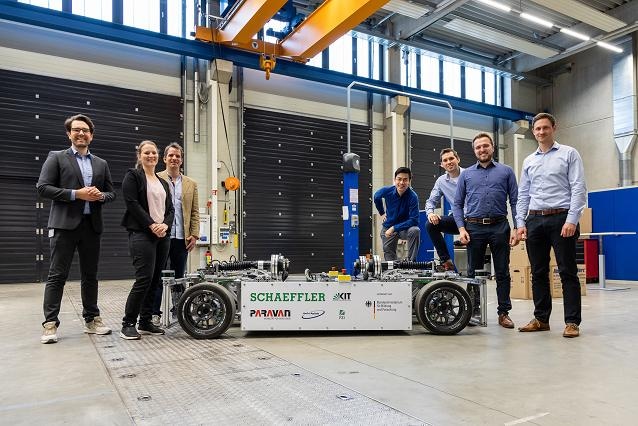For automotive and industrial supplier Schaeffler, electric mobility is one of the most important innovative driving forces for the future. Against this background of increasing vehicle electrification and automation, Schaeffler has been working with several project partners to develop concepts and prototypes for new steering systems in urban applications. After three years, the “OmniSteer” project group, which received a subsidy of 1.9 million euros from the German Federal Ministry of Education and Research, is set for a successful completion.
 With the OmniSteer project, Schaeffler has researched innovative steering systems for electric mobility. Pictured (left to right): project manager Dr Paul Haiduk (Schaeffler) and the team members Madeleine Hoeschle (Schaeffler-Paravan), Mario Kuett (Paravan), Jin Li (Schaeffler), Dominik Nees (Schaeffler), Sebastian Buchwald (Schaeffler) and Philipp Kautzmann (Schaeffler).
With the OmniSteer project, Schaeffler has researched innovative steering systems for electric mobility. Pictured (left to right): project manager Dr Paul Haiduk (Schaeffler) and the team members Madeleine Hoeschle (Schaeffler-Paravan), Mario Kuett (Paravan), Jin Li (Schaeffler), Dominik Nees (Schaeffler), Sebastian Buchwald (Schaeffler) and Philipp Kautzmann (Schaeffler).
Omni stands for orthogonal and multi-directional driving maneuvers and non-linear (German: “nichtlineare”) steering. In combination with the “Schaeffler Intelligent Corner Module” and innovative wheel suspension that allows wider steering angles, functionally reliable mechatronic lateral and transverse (distance and lane) guidance systems have been developed, which will make greater vehicle maneuverability possible in the future.
“For us, OmniSteer is a very valuable project from which we have generated a wealth of knowledge that will be put to use during the subsequent development of products for automated driving,” explained Prof. Dr.-Ing. Tim Hosenfeldt, Senior Vice President Innovation and Corporate Technology at Schaeffler.
The Basis: Electric Wheel Hub Drives
Schaeffler’s E-Wheel Drive electric wheel hub drive is the optimum solution for the mobility of tomorrow. “The initial prerequisite for OmniSteer is the electrification of the drive train and, in a subsequent step, the corresponding integration of the drives into the wheels,” explained project manager Dr. Paul Haiduk. The extremely compact drive opens up entirely new application areas in urban mobility.
Parking is a key area: “The major advantage of having a wheel steering angle of 90 degrees in each direction and wheels that can be steered individually, is that it’s possible to transition from driving in a straight line to parallel parking, without any intermediate stops along the way,” added Haiduk. Depending on the situation, the driver can switch between front-wheel, rear-wheel, and all-wheel steering. Even turning on the spot is possible.